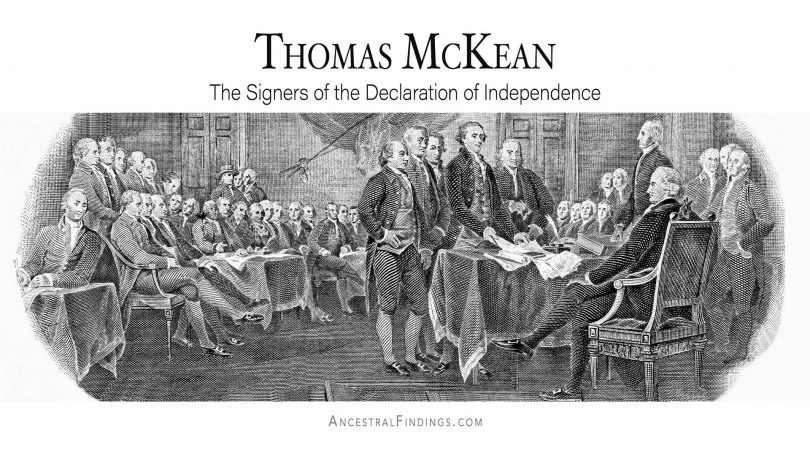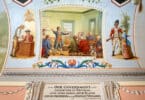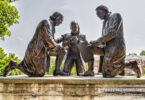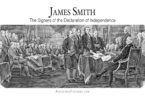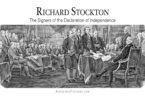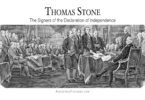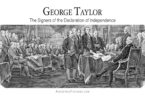Thomas McKean was born in 1734 in Pennsylvania. His parents were William McKean and Letitia Finney. William McKean kept a tavern in the town of New London. Both of his parents were Irish immigrants who came from the village of Ballymoney in County Antrim, Ireland as children and settled with their parents in Pennsylvania.
Thomas married twice. The first time was to Mary Borden, who he married in 1763. They lived together in New Castle, Delaware, and had six children together, two sons and four daughters. Mary passed away in 1773 and was buried at the Immanuel Episcopal Church in New Castle. Thomas’s second wife was Sarah Armitage, who he married in 1774. Thomas lived with his second wife in Philadelphia, Pennsylvania, and they had four children together, one son and three daughters. One of Thomas’s daughters with his second wife (named Sarah for her mother) married a diplomat from Spain named Carlos Martinez de Irujo, 1st Marquis of Casa Irujo, and their son, Carlos Martinez de Irujo y McKean (Thomas’s grandson) became the Prime Minister of Spain.
Thomas was educated as a child at the New London Academy of the Reverend Francis Allison. When he was sixteen years old, Thomas went to New Castle, Delaware, to study law under the tutelage of his cousin, David Finney, on his mother’s side of the family. He was admitted to the bar in the Lower Counties of Delaware in 1755, and in Pennsylvania in 1756. Thomas was appointed Attorney General of Sussex County, Delaware in 1756. Thomas also served, at various times, as a member of the Lower Counties General Assembly (being its Speaker for one term), as a judge of the Court of Common Pleas, and as the Customs Collector, all in Delaware. Thomas was elected to the American Philosophical Society in 1768.
The politics of Delaware were starkly divided in the mid-1700s. There were two factions, known as the Court Party and the Country Party. The Court Party worked well with the provincial government appointed by the British crown, and favored reconciliation with Great Britain. The Country Party was in the minority in Delaware, but were strongly in favor of independence from Great Britain. Thomas was outspoken on the cause of independence, and was the de facto leader of the Country Party in Delaware.
As a member of the Stamp Act Congress, Thomas was part of a group that drew up a list of official grievances and rights that was to be sent to the King. A few of the Congress members did not want to sign. When Thomas asked the Congress’s president, Timothy Ruggles, why he refused to sign the list, Timothy simply stated it was against his conscience to do so. Thomas disputed Timothy’s use of the word “conscience” for so long, and so loudly, that Timothy impulsively challenged Thomas to a duel in front of the Congress. Thomas accepted, but Timothy left town the next day, before the duel was to take place, so there was no duel.
Even though Thomas’s primary residence was in Philadelphia, he maintained a house in Delaware, and spent enough time there that he became the de facto leader for the cause of American independence in Delaware early on, and maintained that position through the American Revolution. This is how he became one of the delegates selected from Delaware to attend the Continental Congress in Philadelphia. He served on both the First and Second Continental Congresses.
When it came time to vote on adopting the Declaration of Independence, Thomas was in favor of it, having been an outspoken proponent of the cause at both Congresses. His fellow delegate from Delaware, George Read, was against it. The third delegate from Delaware, Caesar Rodney, was absent at home because he was elderly and ill at the time. Without Caesar’s vote for independence, the Delaware delegation could not vote for or against it, as a majority of a colony’s delegates had to vote one way or the other for the vote to count. Thomas was determined that Delaware vote in favor of independence, so he sent word to Caesar, and asked him to ride all night to the Congress to vote in favor of it. Despite his frail condition, Caesar obliged, feeling as strongly for the cause of independence as Thomas.
A few days after voting in favor of the Declaration of Independence, Thomas left the Congress to serve as a commanding colonel of the Fourth Battalion of the Pennsylvania Associators, which was a militia created in 1747 by Benjamin Franklin. This militia joined up with George Washington’s defense of New York at Perth Amboy, New Jersey. Because he was away when the Declaration was signed, his signature did not appear on the official copies of the Declaration that were made. Yet, he did sign the original copy at some point, as his signature is on it. It is not known the exact date that Thomas signed the original version of the Declaration of Independence, but it was after the official copies were authenticated in January of 1777. Some historians believed he may not have signed until as late as 1781. Sign he did, though. It was that important to him.
Because most people in Delaware were against independence at the time Thomas and Caesar Rodney were not initially re-appointed to the Congress by their colony. Yet, after the British occupation of Delaware after the Battle of Brandywine, opinions in Delaware largely swung the other way, toward independence, which led to Thomas being re-appointed to the Congress in October of 1777. During this time, the British soldiers were in pretty much constant pursuit of Thomas, and because of this, during the Revolution he was forced to move his family five times to keep them safe.
Thomas was elected as President of the Continental Congress in July of 1781, and served in this position until November of 1781. During his time as President of the Congress, the British surrendered to American forces at Yorktown, thus ending the American Revolution in favor of the colonists.
Thomas had a long and interesting political career after his time on the Continental Congress, as well. In fact, he kept active in political matters in the new United States in both Delaware and Pennsylvania for the rest of his life. He was also awarded with honorary law degrees by Princeton College, Dartmouth College, and the University of Pennsylvania. He published a paper with Professor John Wilson in 1790 called Commentaries on the Constitution of the United States.
Thomas passed away in June of 1817 in Philadelphia, and was buried at the Presbyterian Church Cemetery in that city. Later, in 1843, he was moved to Laurel Hill Cemetery.
There are several streets named after Thomas today. He is also remembered by history for being quite the character, both visually and with his personality. Those who knew him described him as being quick-tempered, and as having a vigorous personality, and he was someone who was often at the center of a controversy. He was over six feet tall, which made him tower over most other men of his time, and he dressed flamboyantly, being commonly seen in a wide-brimmed hat with a large feather, and carrying a gold-handled cane. John Adams once described Thomas as
“one of three men in the Continental Congress who appeared to me to see more clearly to the end of the business than any others.”

